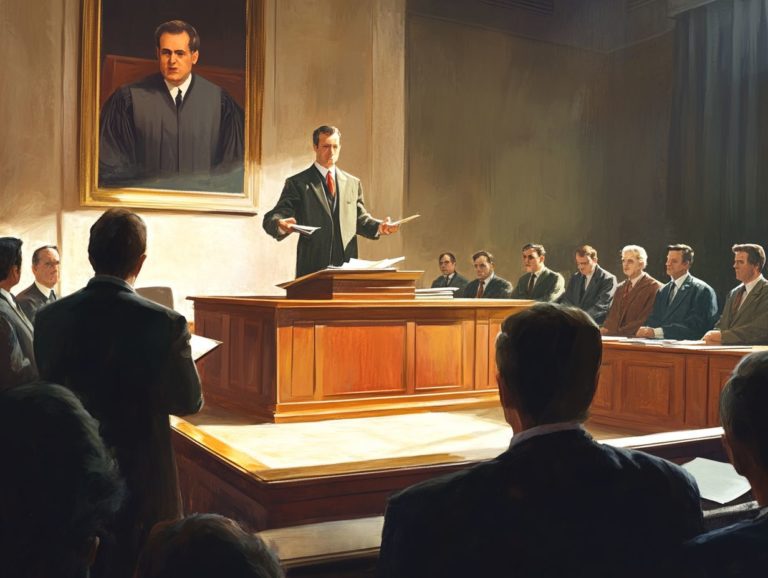Understanding Mistake of Fact as a Defense
In the intricate realm of law, the concept of “mistake of fact” plays an important part in influencing the outcomes of legal cases. This defense rests on the premise that a misunderstanding or misinterpretation of facts can reduce liability or even exonerate a defendant from guilt.
This guide also covers the definition and various types of mistake of fact. It outlines the essential elements required to substantiate this defense and its significance in different cases. You’ll discover crucial insights that can shape your legal defense!
Whether you re a legal professional or simply intrigued by the complexities of law, this guide provides valuable insights into a nuanced yet important facet of legal defenses.
Contents
- Mistake of Fact Defense: Understanding Its Strengths and Limitations
- Relevance to the Case
- Examples of Mistake of Fact Defenses
- Real-Life Cases and Outcomes
- Limitations of Mistake of Fact Defense
- When the Defense Cannot Be Used
- Tips for Using Mistake of Fact Defense Effectively
- Frequently Asked Questions
- What is mistake of fact as a defense?
- How is mistake of fact different from mistake of law?
- What are the two types of mistake of fact?
- What is an example of a unilateral mistake of fact?
- How does mistake of fact affect the outcome of a criminal case?
- Can mistake of fact be used as a defense for all crimes?
Key Takeaways:
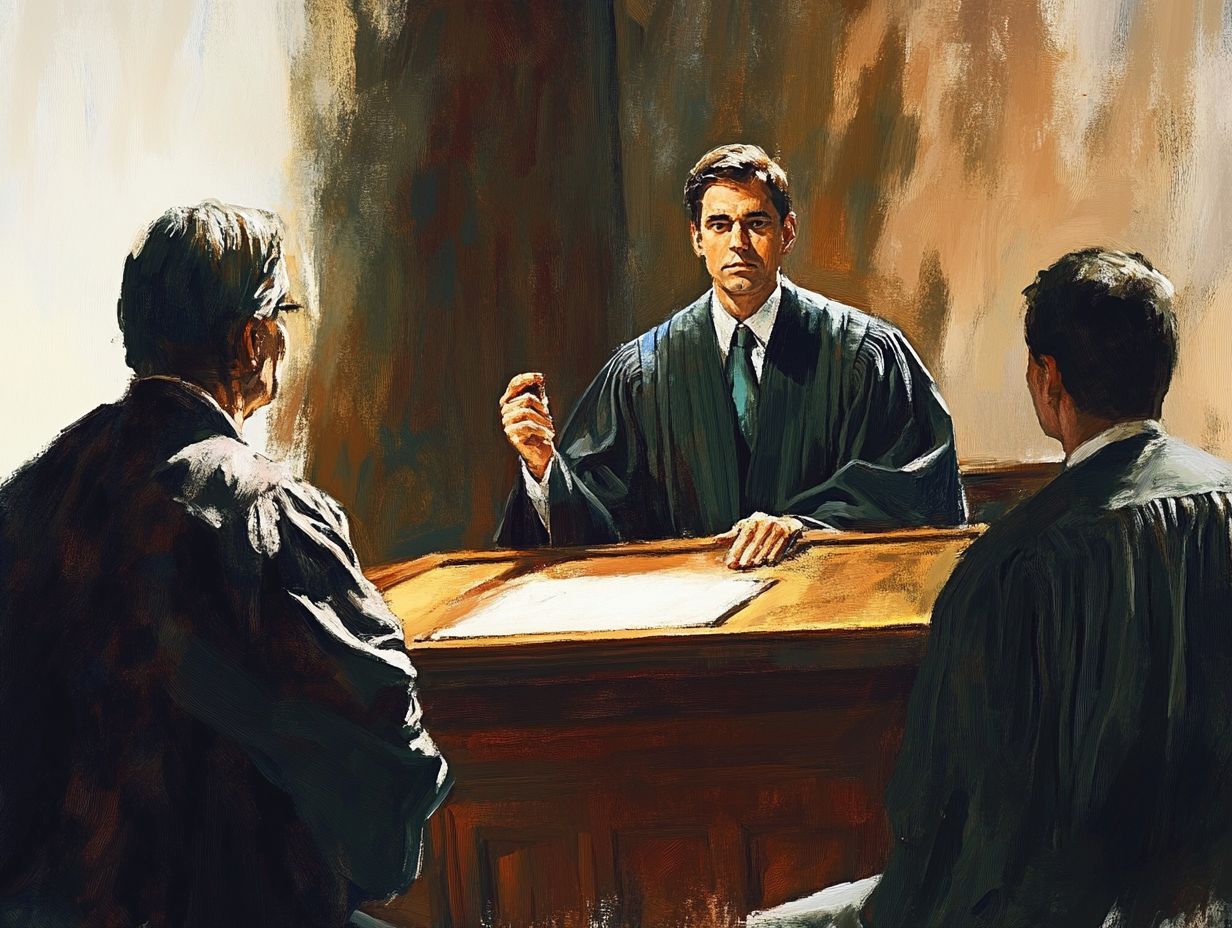
Mistake of fact is a legal defense used when a person believes something incorrect but does so honestly and reasonably. It s essential to consider the limitations of this defense and strategize effectively to build a strong case.
Mistake of Fact in Legal Terms
A Mistake of Fact refers to a misunderstanding about a factual element of a situation that can profoundly impact your legal standing in criminal cases.
Under California law, this concept can serve as a viable legal defense. It enables you to argue that your mistaken belief undermines the criminal intent required for guilt. This is different from a mistake of law, where ignorance of legal statutes usually doesn t release you from liability.
Grasping how Mistake of Fact applies can offer you vital insights into crafting a successful defense strategy, potentially steering you toward favorable outcomes in criminal allegations.
Definition and Types of Mistake of Fact
The definition of Mistake of Fact includes various scenarios where you might misinterpret a factual circumstance. This misinterpretation can impact your legal responsibility in criminal charges.
These misinterpretations can take distinct forms, such as a genuine mistaken belief, where you truly did not grasp the situation, or erroneous beliefs that could arise from misreading the law or surrounding facts.
For example, in the landmark case of People v. Mayberry, the court explored how misjudging someone s intentions can significantly affect your legal standing.
These nuances matter greatly, as they are closely tied to the concepts of Mens Rea, meaning “guilty mind,” which refers to the mental state of a person when committing a crime, and criminal intent. If you genuinely believed your actions were lawful, your responsibility may be reduced, highlighting the importance of understanding your mental state in relation to the alleged crime.
Elements of a Mistake of Fact Defense
The elements of a Mistake of Fact defense rely on your ability to demonstrate that your misunderstanding directly affects a material element of the crime, effectively negating any criminal intent.
Proving the Mistake
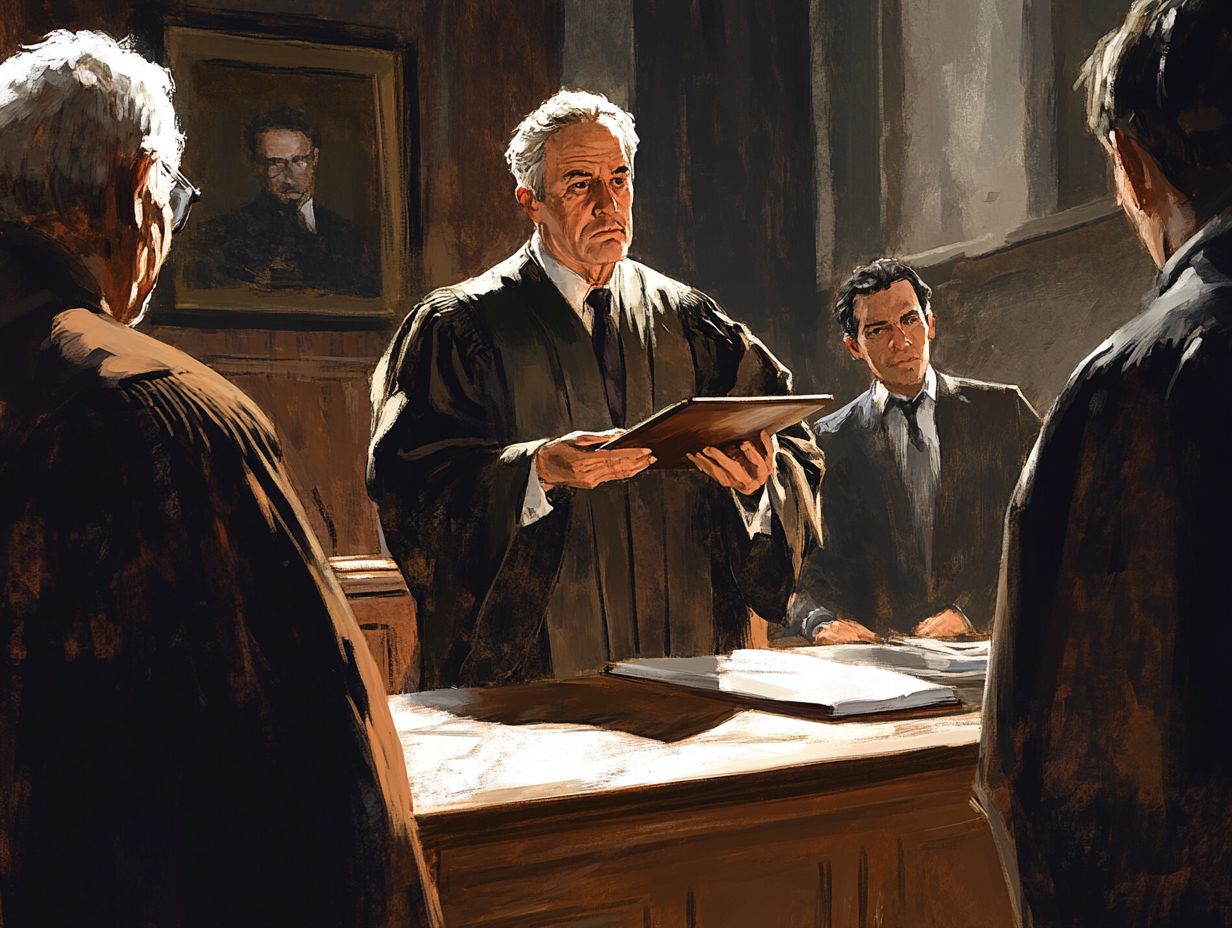
Proving a Mistake of Fact requires a thorough and strategic approach. This often necessitates testimony from a skilled criminal defense attorney to establish your reasonable belief at the time of the alleged offense.
The process begins with gathering substantial evidence and witness statements that articulate the context in which the misunderstanding occurred. Your defense must effectively show that you held a genuine, albeit incorrect, belief regarding a critical fact of the situation.
Case law is crucial in this endeavor. Precedents provide valuable frameworks for how courts have interpreted similar claims in the past. It’s vital to understand the significance of the burden of proof; you need to present compelling evidence to convincingly argue that your mistake was not merely an oversight but a reasonable misapprehension.
This combination of clarity in testimony and legal precedent forms the backbone of a robust defense against criminal allegations.
Want to strengthen your defense? Read on to uncover vital strategies!
Mistake of Fact Defense: Understanding Its Strengths and Limitations
Relevance to the Case
How important is a Mistake of Fact in a case? It often reshapes how the defendant’s criminal conduct is interpreted. This ultimately influences the legal strategy you choose to employ.
This defense can skillfully shift the focus from alleged criminal intent to your subjective understanding of the circumstances surrounding the act. For example, if you genuinely believe that an item belongs to you, that misjudgment could serve as a solid basis for defending against theft charges.
Legal interpretations are anything but one-size-fits-all; they evolve based on the unique specifics of the case. This includes the nature of the alleged offense and the surrounding facts.
Effective defense strategies often focus on presenting credible evidence that illustrates a genuine misinterpretation of facts. This may involve spotlighting inconsistencies in witness testimonies or law enforcement procedures to reinforce your claim.
Examples of Mistake of Fact Defenses
Real-life cases of Mistake of Fact defenses showcase how defendants can adeptly maneuver through complex legal landscapes. They emphasize the intricate nuances that accompany criminal allegations.
Real-Life Cases and Outcomes
Several notable real-life cases have successfully employed Mistake of Fact defenses. These cases have led to varied outcomes in California courts that underscore the importance of legal interpretation.
In these instances, defendants have often argued that their misunderstandings of certain facts negated their intent to commit a crime.
For example, imagine a defendant who mistakenly believed that someone else’s property belonged to them. This individual was acquitted, demonstrating how courts place significant weight on genuine confusion about the circumstances.
On the flip side, consider another case where a defendant claimed he believed he had permission to use someone else’s vehicle. In this situation, the court ruled against him, highlighting the critical necessity of being aware of the facts surrounding any given situation.
The contrast between these outcomes reveals the intricate nature of legal defenses. It illustrates how the specifics of each case can dramatically influence the interpretation of criminal intent.
Limitations of Mistake of Fact Defense
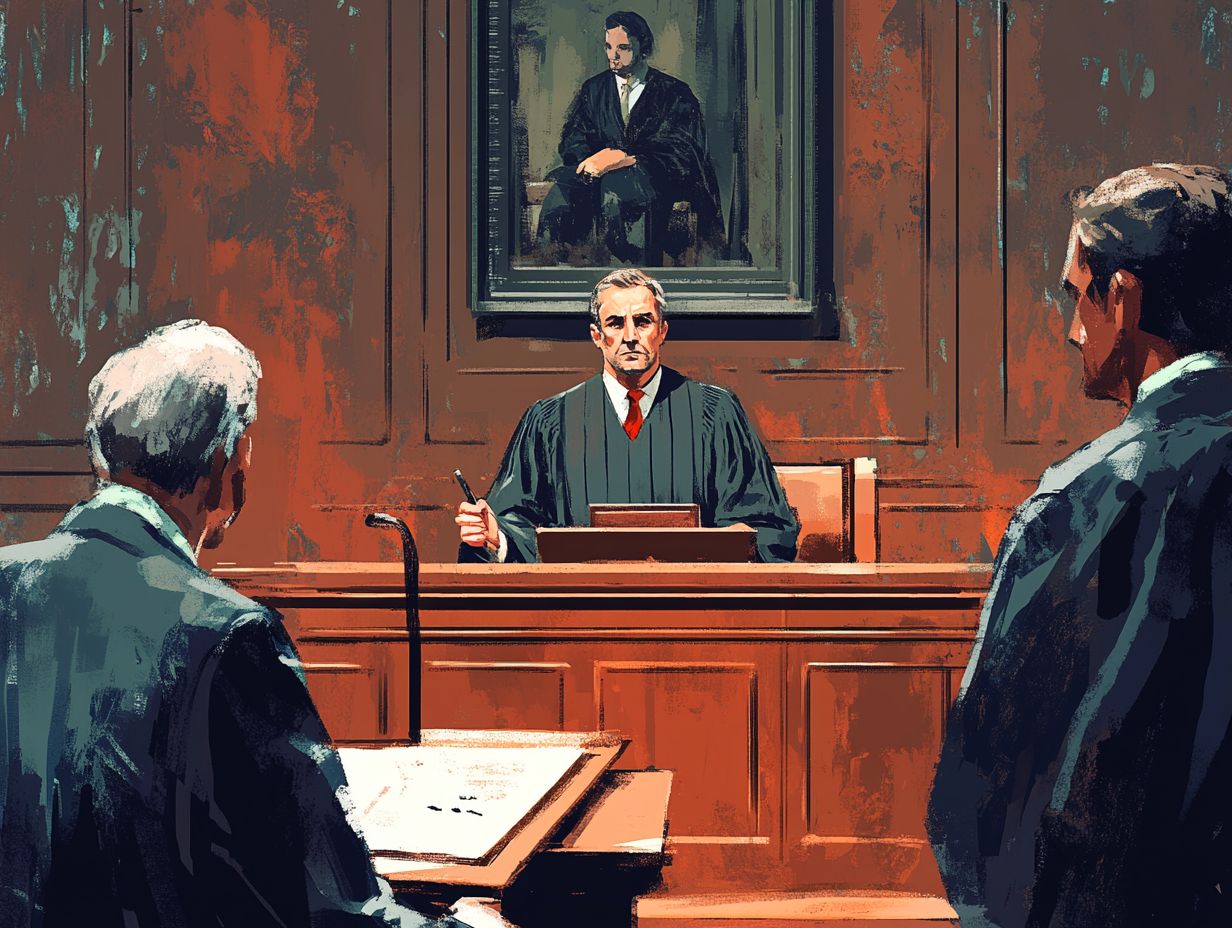
While the Mistake of Fact defense can be a potent tool in your legal arsenal, you must know its key limitations.
Understanding these limits can make or break your case when navigating the complexities of criminal liability and the specific nature of the offense at hand.
When the Defense Cannot Be Used
Under California law, there are specific situations where the Mistake of Fact defense simply won t work. This often depends on the nature of the criminal conduct involved.
For instance, this defense typically doesn t apply to serious felonies or cases where the actions are considered inherently wrongful, such as violent crimes or sexual offenses. The California Penal Code clarifies that a mistaken belief about a legal fact like thinking you have the right to take someone else’s property won’t protect you from liability if that belief arises from circumstances that a reasonable person would recognize as questionable.
Ultimately, it s up to you, the defendant, to prove that your misunderstanding was both sincere and reasonable. This can be quite the uphill battle in certain legal scenarios.
Tips for Using Mistake of Fact Defense Effectively
Employing a Mistake of Fact defense requires meticulous planning and strategic thought.
Focus on establishing a reasonable belief and gathering robust supporting evidence to strengthen your position effectively.
For personalized guidance, consult a legal expert who can help you navigate your specific situation.
Strategies for Building a Strong Case
Building a strong case around a Mistake of Fact defense requires you to use principles from case law. Ensure that these align with how a reasonable person would perceive the situation.
Start by reviewing relevant case law. Identify precedents that support your arguments.
This foundational knowledge helps you craft a narrative. Your narrative should show that the defendant’s misunderstanding was genuine and reasonable.
Expert witness testimony can significantly boost your case. These professionals clarify the nuances of the situation and illustrate how a reasonable person might have made a similar mistake.
By reinforcing the definition of a reasonable person, you can create a compelling case that effectively challenges the prosecution s narrative.
Frequently Asked Questions
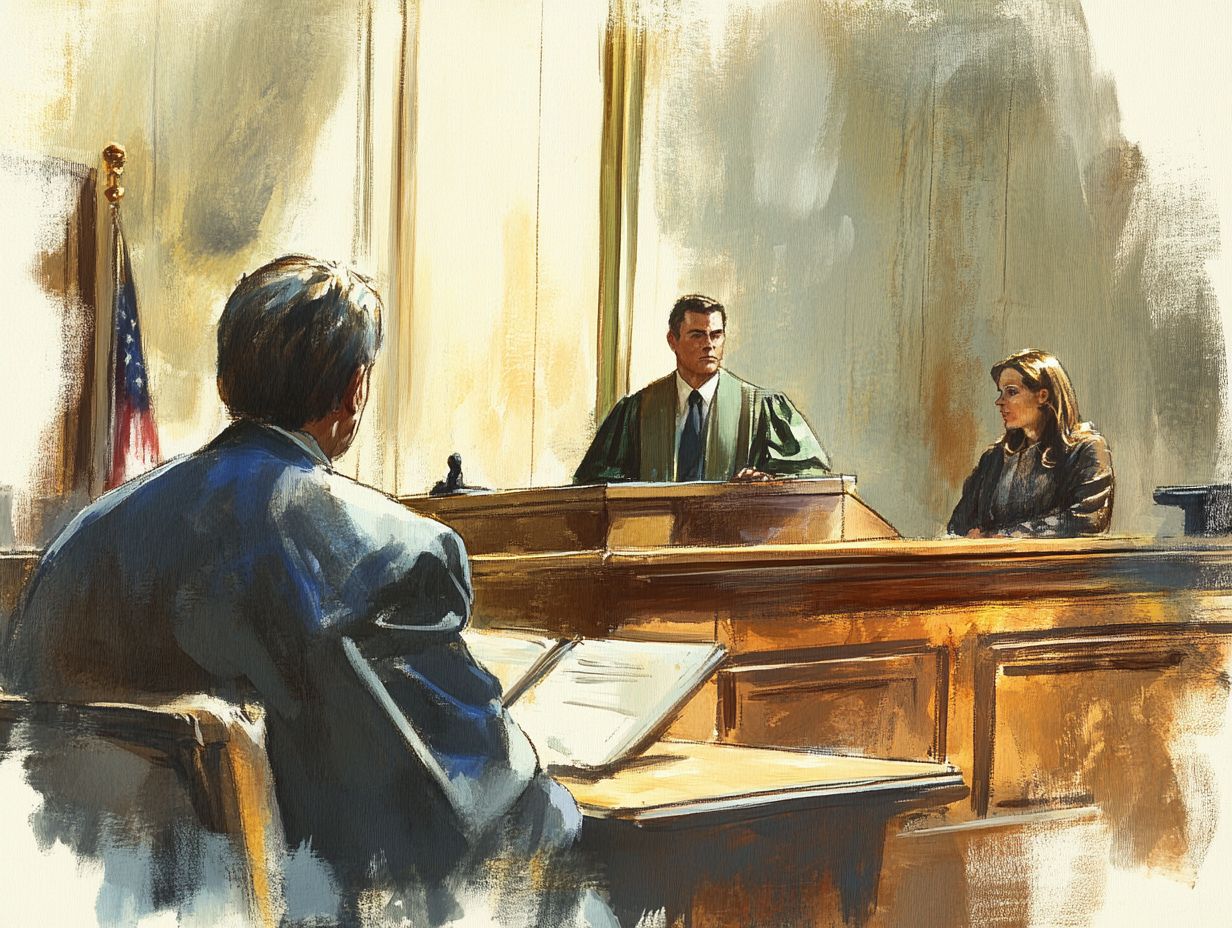
What is mistake of fact as a defense?
Mistake of fact is a legal defense in criminal cases. It applies when the defendant made an honest and reasonable mistake about a fact.
This defense can negate the mental state or intent behind a crime.
How is mistake of fact different from mistake of law?
Mistake of fact involves misunderstanding a fact or situation. Mistake of law refers to incorrect beliefs about the legal consequences of actions.
While mistake of fact can be a valid defense, mistake of law typically cannot.
What are the two types of mistake of fact?
The two types are unilateral and mutual. Unilateral mistake occurs when only one party is mistaken, while mutual mistake involves both parties being mistaken.
What is an example of a unilateral mistake of fact?
An example is when someone mistakenly takes another person’s coat, believing it to be theirs. They didn’t intend to steal; they made an honest mistake about ownership.
How does mistake of fact affect the outcome of a criminal case?
If the defense is successful, the defendant might be acquitted. But if the mistake wasn’t honest or reasonable, it may not negate the intent element.
Can mistake of fact be used as a defense for all crimes?
No, it only applies to specific crimes where intent can be negated. For strict liability crimes, where intent isn’t required, this defense may not work.


